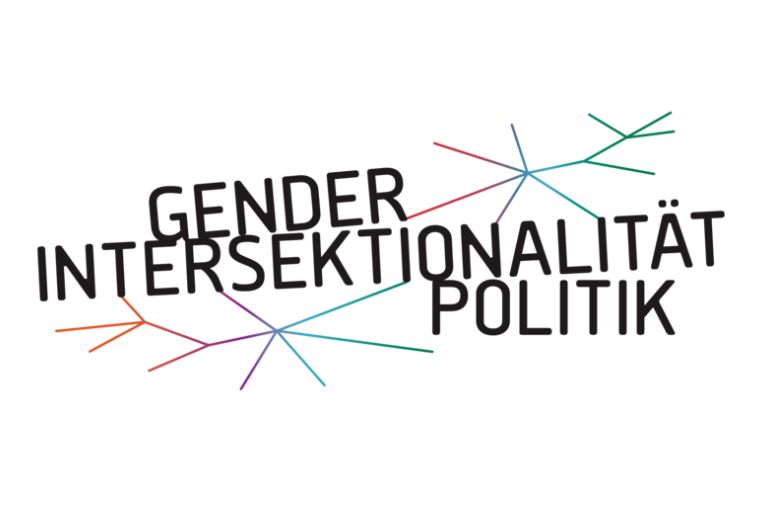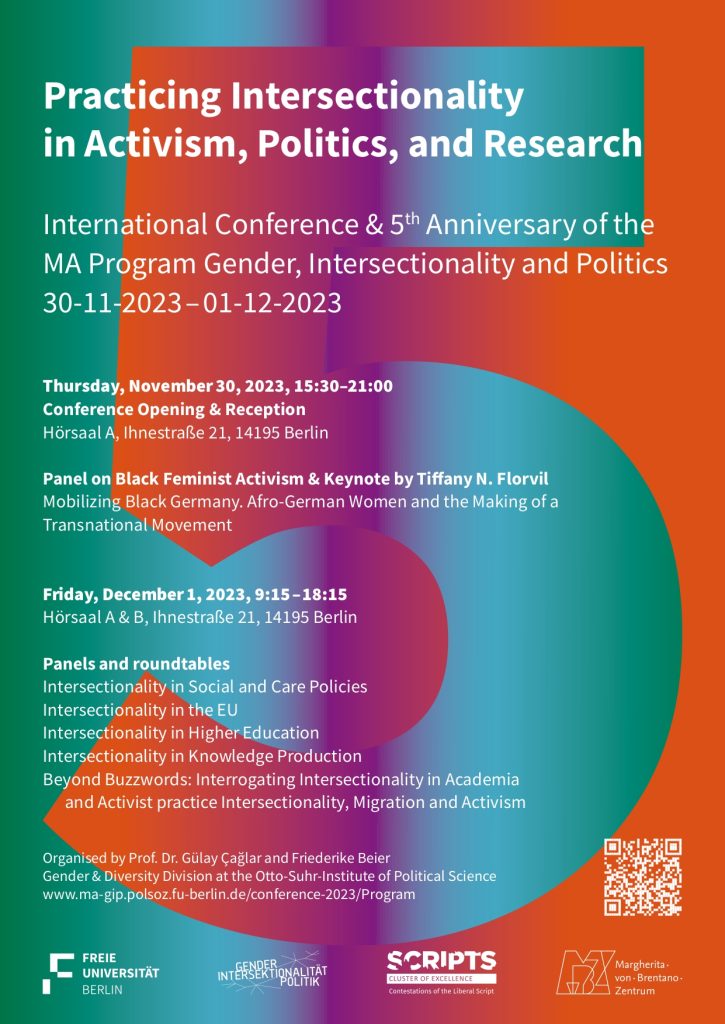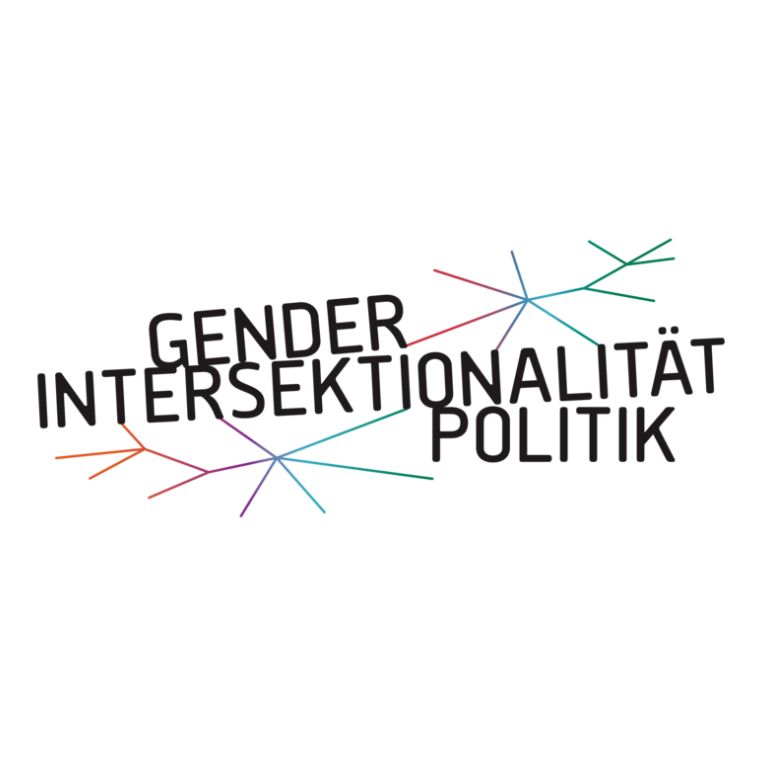
30.11.2023 & 01.12.2023 – The conference Practicing Intersectionality in Research, Activism and Politics organised by the division for Gender & Diversity at Freie Universität aims at identifying the current state of intersectionality research in social sciences. Keynote speaker Tiffany N. Florvil focuses on mobilizing Black Germany. Please register now.
In the last two decades, intersectionality has been widely established both as a framework and field of study within gender studies and as a practice in feminist movements and politics. Intersectionality, a term introduced by Kimberlé Crenshaw, has gained a great deal of popularity as it provides a prism to identify complex and intersecting social inequalities. Putting Black women’s experiences of discrimination and marginalisation at the centre, Crenshaw argues for overcoming a single-axis thinking both, in anti-discrimination law and in political strategies of feminist movements. Yet the popularity and reach of intersectionality has been accompanied with contestations over the meaning of intersectionality and the direction of intersectionality studies.
The organisers Professor Dr. Gülay Çağlar and Friederike Beier of the Division for Gender & Diversity, focus on the critical aspects of the institutionalisation of intersectionality in academia. Especially the appropriation by white feminists (particularly in Europe) is leading to a de-politisation and to—as Sirma Bilge puts it—a “whitening of intersectionality” since the category of race and with it, the focus at Black women’s experiences, increasingly disappear from scholarly engagements. Furthermore, the apects of intersectionality’s other aspects, such as racism, sexism, capitalism, ableism and homophobia within different social and political contexts is considered critically. Leading questions of the conference are: What consequences do feminist scholars in this disciplinary field draw from these debates for their research? What are their practices of knowledge production and how do they engage with institutions and communities that practice intersectionality? How do students of political science and early career scholars perceive the debates and attach meaning to the concept of intersectionality?
Program
| Conference Day 1 | Thursday, November 30, 2023 |
|---|---|
| 15:30 – 16:00 | Welcome Notes & Introduction |
| 16:00 – 17:45 | Panel 1: Black Feminist Activism Jihad Yagoubi: Framing the intersections of northern African Black feminist thought and activism: Sketching the boundaries of a blueprint Juliana Streva: Quilombo Tactics: Afrodiasporic Poethics and Politics of Vitality Pamela Ohene-Nyako: Caught in a Vice: Black Female Activists in France and le droit à la différence culturelle, 1970s-1990s |
| 17:45 – 18:15 | Coffee break |
| 18:15 – 19:45 | Keynote by Tiffany N. Florvil: Mobilizing Black Germany. Afro-German Women and the Making of a Transnational Movement |
| 19:45 – 21:00 | Reception |
| Conference Day Two | Friday, December 1, 2023 |
| 8:45 – 9:15 | Registration |
| 9:15 – 10:45 | Panel 2: Intersectionality in Social and Care Policies (Hörsaal A) Laura Andrea Álvarez Tobar: Intersectional Analysis of Social Policy Legislation: a Case Study of Spain Manuela Stein da Silva Barbosa: Intersectional Inequalities in the Context of Care Work in Brazil Cari_na Maier: Reflections upon intersectional perspectives on care within feminist theory Parallel panel: Panel 3: Intersectionality in the EU (Hörsaal B) Petra Debusscher: Intersectionality in the European Union: a framework for policy analysis Laura Eigenmann, Bontu Lucie Gutschke, Kathrin Zippel: Intersectional transformation or ‘gender equality +’? Intersectionality in EU policies on research and science Liza Mügge: Intersectionalizing European politics: Bridging gender and ethnicity |
| 10:45 – 11:15 | Coffee break |
| 11:15 – 12:45 | Panel 4: Intersectionality in Higher Education (Hörsaal B) Elena Aoun, Alena Sander: The intersectional killjoy at the university Katharina Heermann: The significance of diversity and social processes in law studies and the legal profession – A mixed-methods survey at Freie Universität Berlin Parallel panel: Panel 5: Intersectionality in Knowledge Production (Hörsaal A) Aneri Vora: The Travels and Travails of Intersectionality: A Critical Appraisal of its Conceptual Applicability/Utility in the Context of India Jo Krishnakumar & Vibhavari Desai: “It was meant to be one Instagram post”: Building Trans/form, a Community-Led Tool to Understand Anti-Trans Violence in India Mariam Salehi: Processual and situated perspectives in conflict research |
| 12.45 – 14:15 | Lunch break |
| 14:15 – 15:45 | Round table: Beyond Buzzwords: Interrogating Intersectionality in Academia and Activist practice (Hörsaal B) Organised by students of the MA program Gender, Intersectionality and Politics |
| 15:45 – 16.15 | Coffee break |
| 16.15 – 18:00 | Panel 6: Intersectionality, Migration and Activism Tunay Altay, Naika Foroutan, Gölce Yurdakul: Undoing one-dimensional immigrant: Revisiting difference through postmigrant paradigm in Germany Karolina Lebek: Emotions, intersectionality and feminism activism: emotional responses to the practice of intersectionality in the transnational feminist movement in Berlin Lee Eisold: Prioritisations and coalition building in a white-led antiracist activist landscape: Drawing on understandings of intersectionality in (antiracist) activism in Flanders, Belgium |
| 18.00 | Closing remarks: Gülay Çağlar |
| 18.15 – 22.00 | Get together Organised by the Student Council of the Master Gender, Intersectionality and Politics |
When & Where?
- Thursday, Nov 30th 2023 | 15:30 – 21:00 | Hörsaal A, Ihnestraße 21, 14195 Berlin
- Friday, Dec 1st 2023 | 09:15 – 18:15 | Hörsaal A & B, Ihnestraße 21, 14195 Berlin
- Registration: Please email your name, institution and accessibility needs to ma-gip@polsoz.fu-berlin.de
Information

